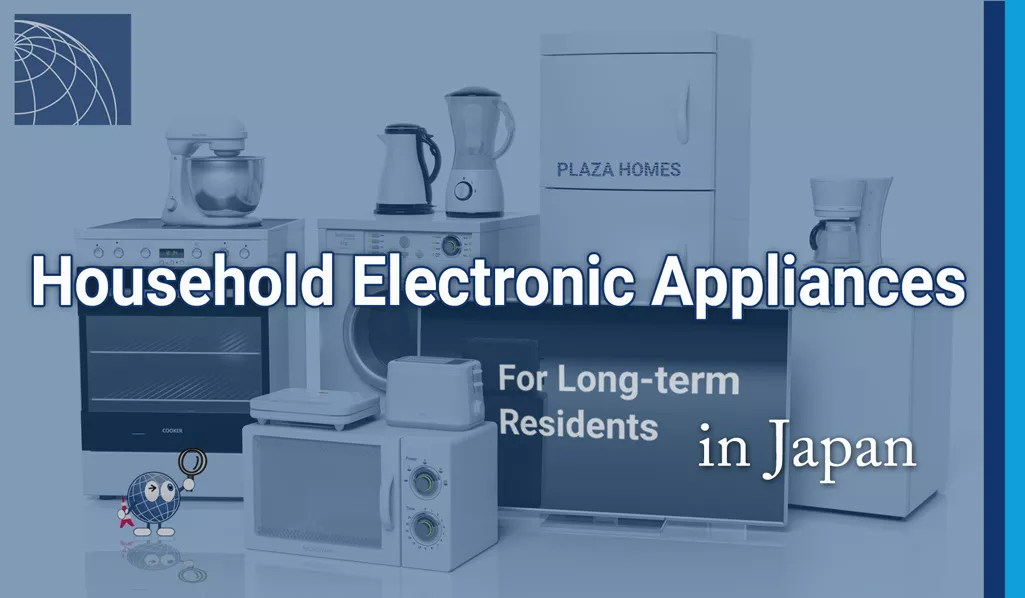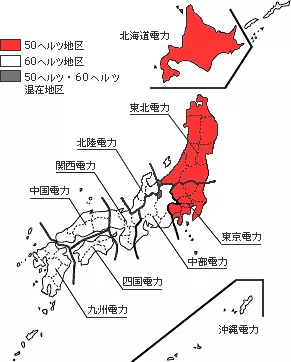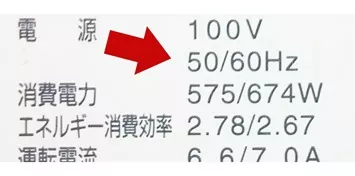Household Electronic Appliances in Japan - For Long-term Residents

When a foreigner moves long-term to Japan such as for starting a new life as an expat, you will need to use household appliances in the rental apartment. If you bring appliances from your home country, you will face a lot of cumbersome matters. Here we show below the guidance on the voltage and electric frequency in Japan as well as how to purchase and lease appliances.
About the voltage in Japan
Japan uses a 100 volt current while 100-240 volt currents are used outside of Japan.
If you wish to use an appliance from a European or other country operating on higher volt currents, you will need a step-up transformer for use on Japan’s 100 volt current. These are available at general electronic stores in Japan, but are often quite expensive and cost between 5,000 - 50,000 Yen per unit. When the shape of the plug is different, an appropriate plug adapter is also necessary.
Another issue is that a 50-cycle current is used in Eastern Japan and a 60-cycle current is used in Western Japan, and the difference of the cycle makes appliances reduce their performance or can even make the appliance unusable in the other part of Japan. However, this is no longer a major issue because many products can be used with both voltages.

Image : From Tokyo Denryoku Website
Labeled description:
- 50Hz available in Eastern Japan
- 60Hz available in Western Japan
- 50/60Hz available everywhere in Japan

Bringing an appliance from your home country is not recommended when considering the cost of transportation and the transformer plus the deterioration of performance. We recommend the following options for a foreigner who will stay and live in Japan on a long-term basis.

- Furnished Monthly Apartments in Tokyo for Expats
- Fully furnished short-term rentals in Tokyo's expat areas
Buying and leasing appliances in Japan
1. To purchase Household Appliances in Japan
Japanese appliances have high quality and performance, but are generally smaller in size than European and American ones.
Example) Microwave oven: It usually comes with an oven function but is of the size which a Thanksgiving or Christmas turkey do not fit.
While Japanese appliances designed to be sold overseas usually come with English-written user manuals, standard Japanese appliances don’t include the manuals in English. So make sure you check how to use it or try to obtain English manuals from the manufacturer when you buy appliances with complicated functions. There are also some European and American appliances which you can buy in Japan.
You can also frequently find used appliances for sale cheaply in the classified ads listed by foreigners who will leave Japan. These are called “SAYONARA Sales” and can be found on bulletin boards or on classifieds on the Internet for the foreign community.
SAYONARA SALE (Facebook Group)
You can also order online electrical appliances.
2. To lease Household Appliances in Japan
Another way is to rent appliances from a furniture leasing company for the period of your stay and life in Japan. There are English-speaking leasing companies which provide services for foreign customers and lease furniture and appliances suited for a European and American lifestyle. Tokyo Lease Corporation carries a wide variety of appliances and also provides English-speaking services from explaining their functions and how to use to installing them at your home. Tokyo Lease carries not only basic appliances such as TVs, DVD players, and vacuum cleaners, but also other electronic goods such as massage chairs and electronic pianos.
3. To live in a Rental Apartment including appliances
Many expat oriented apartments include the following appliances:
Refrigerator, Washing machine, Dryer, Oven, Dishwasher
These appliances are generally larger size (Western sized) and are ones that are familiar to foreigners.
For example the oven is large enough for cooking a turkey or a large size pizza.
The equipment listed in the residence property information is usually included in the rent for the property.
However, TV, DVD player, vacuum cleaner, and an iron are usually not included so you have to lease or buy them.
4. To live in a Serviced Apartment including furniture and appliances
There are Serviced / Monthly Apartments which includes furniture, appliances, cooking utensils, table ware, linens, all the utilities and cleaning service, but the rent becomes considerably more expensive.
We recommend long-term-stay expats for leasing furniture and appliances for the period of their stay in Japan.
When you discard large appliances such as Refrigerator, Washing machine, Dryer, and TV, it is not free, and each item has a price designated by the government under the “Home Appliance Recycling Law”.

- Rental Apartments & Houses in Tokyo
- Listings of popular and luxurious rental apartments, condominiums, and houses designed with expats in mind.

- Apartments & Houses for Sale in Tokyo
- Listings of apartments, condominiums, and houses available for purchase in Tokyo.



















